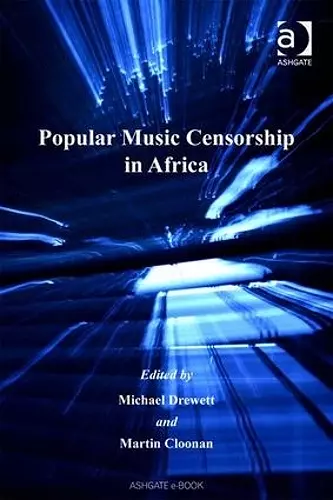Popular Music Censorship in Africa
Martin Cloonan author Michael Drewett editor
Format:Hardback
Publisher:Taylor & Francis Ltd
Published:28th Aug '06
Currently unavailable, and unfortunately no date known when it will be back
This hardback is available in another edition too:
- Paperback£52.99(9781138257252)

In Africa, tension between freedom of expression and censorship in many contexts remains as contentious, if not more so, than during the period of colonial rule which permeated the twentieth century. Over the last one hundred years popular musicians have not been free to sing about whatever they wish to, and in many countries they are still not free to do so. This volume brings together the latest research on censorship in colonial and post-colonial Africa, focusing on the attempts to censor musicians and the strategies of resistance devised by musicians in their struggles to be heard. For Africa, the twentieth century was characterized first and foremost by struggles for independence, as colonizer and colonized struggled for territorial control. Throughout this period culture was an important contested terrain in hegemonic and counter-hegemonic struggles and many musicians who aligned themselves with independence movements viewed music as an important cultural weapon. Musical messages were often political, opposing the injustices of colonial rule. Colonial governments reacted to counter-hegemonic songs through repression, banning songs from distribution and/or broadcast, while often targeting the musicians with acts of intimidation in an attempt to silence them. In the post-independence era a disturbing trend has occurred, in which African governments have regularly continued to practise censorship of musicians. However, not all attempts to silence musicians have emanated from government, nor has all contested music been strictly political. Religious and moral rationale has also featured prominently in censorship struggles. Both Christian and Muslim fundamentalism has led to extreme attempts to silence musicians. In response, musicians have often sought ways of getting their music and message heard, despite censorship and harassment. The book includes a special section on case studies that highlight issues of nationality.
'Each contribution is a well-written, self-contained unit. Drewett [...] and Cloonan [...] are to be commended for selecting knowledgeable contributors for this book, which will interest student of African popular music in general and censorship in particular... Recommended.' Choice ’... this book is a groundbreaking and highly engaging text that will hopefully encourage additional and broader discussion of music censorship in Africa and around the world... While compiling a valuable resource for scholars and students, the editors also use the book to present a blatant call to arms to musicians and activists to resist oppression.’ Popular Music ’The strength of the book [...] is that it convincingly and with many fine case studies paves the way for more research on the important issue of music censorship. As such Popular Music Censorship in Africa will be of interest to both scholars and students.’ Ethnomusicology Forum
ISBN: 9780754652915
Dimensions: unknown
Weight: 453g
242 pages